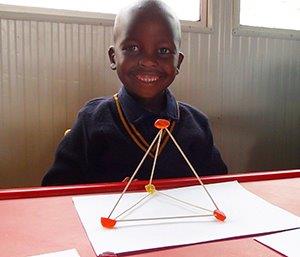Latest News Archive
Please select Category, Year, and then Month to display items
08 April 2021
|
Story Thabo Kessah
|
Photo UFS Photo Archive
 Dr KPD Maphalla with former UFS Chancellor, Dr Franklin Sonn, during the graduations in April 2007.
Dr KPD Maphalla with former UFS Chancellor, Dr Franklin Sonn, during the graduations in April 2007.
The University of the Free State is sad to learn of the passing of alumnus and award-winning Sesotho literary giant, Dr KPD Maphalla.
The literary works of Dr Khotso Pieter David Maphalla, like many other African writers and artists, were influenced and characterised by his own era of powerful forms of oppression and exclusion from dominant literary discourses. In his own right and through his writings of poetry, novels, short stories, and kodiamalla (dirge), he articulated a deliberate political and social protest and pushed for a place for African languages in literature at the height of apartheid.
“He entered the professional scene with his ground-breaking novel, Kabelwamanong, in 1982 at the age of 27. His career actually started in 1971 while he was still at school. Since his first novel, he has produced at least two books annually, covering the genres of poetry, novels, dramas, and short stories. As a dramatist, Dr Maphalla has written a number of excellent and educative radio dramas for the then Radio Sesotho (now Lesedi FM),” said his long-time friend and Head: African Languages at the University of the Free State, Dr Nyefolo Malete.
“It was for this writing prowess that he received recognition from the UFS when he was awarded an Honorary Doctorate in Literature by the Department of African Languages during a momentous ceremony on the Qwaqwa Campus in 2007,” added Dr Malete.
Dr Malete also revealed that, despite losing the use of his right hand after suffering a stroke following a car accident in the late 1990s, Dr Maphalla continued writing using his left hand. “He was adamant that, what he referred to as his ‘supposed disability’, would not deter his passion for writing.”
Dr Maphalla’s work has also produced numerous scholarly studies by the likes of Profs Moleleki Moleleki (protest poetry), Thapelo Selepe (lament and protest poetry), and Dr Seema Seema (process of cross-cultural communication). He was a committed Qwaqwa community member, who was also instrumental in the founding of Qwaqwa Community Radio (2000) and Metjodi Writers (2006), among others. He has written more than 70 books, many of which have been prescribed texts in schools.
Some of the awards he has won include:
South African Centre for Digital Language Resource (SADiLar) Sesotho Lexicographic Unit (Sesiu sa Sesotho) Lifetime Award for outstanding literary works and for promoting Sesotho literature (2019).
The Literature Festival and the University of the Free State Award for enormous contribution to Sesotho literature by a South African writer (2019).
Lifetime Achiever Award in Literature awarded by the Department of Arts and Culture (2005).
M-Net Book Prize for Sesotho poetry (2005). The first and thus far the only Sesotho author to have received this honour.
M-Net Book Prize for best novel (1996).
De Jager-HAUM Literary Award for his volume of short stories, Mohlomong Hosane (1993).
Thomas Mofolo Trophy for Best Novel, Best Poetry, and the Overall Award (1992).
Thomas Mofolo Trophy for Best Poetry (1991).
Dr JJ Moiloa Floating Trophy for Best Sesotho Poetry Book of the Year, Kgapa tsa ka (1985).
Science 4Fun, collaboration between CUT and UFS community engagement
2017-08-16

For Grade R learners at Nzame Primary, their
basic Geometry insight about shapes advanced
to engineering skills when they built modern pyramids,
connecting jelly sweets and sosatie sticks.
Photo: Supplied
Any phase in a learner’s life can be the right time to explore science. As for Grade R learners at Nzame Primary School in Mangaung, it all started when their Deputy Principal, Charles Busack, attended the Global University for Lifelong Learning (GULL) workshop coordinated by the university’s Community Engagement in October 2016. The GULL network enables its affiliated organisations to recognise the individual and collective efforts of those who are creating progressive transformation in communities and in the workplace. Consequently, a community-based initiative, Science4Fun, was developed and launched at the primary school, where learners would start to experiment with science through play.
University students instrumental in teaching
Every Tuesday morning, these fun science activities form part of the foundation phase programme, in which Dr Elizabeth Conradie of the Central University of Technology (CUT) and four postgraduate Science students from the UFS, engage teachers and learners in exciting experiments and demonstrations.
Most people just know pyramids as big, impressive structures built a long time ago in Ancient Egypt. However, for Grade R learners at Nzame Primary, their basic Geometry insight about shapes advanced to engineering skills when they built modern pyramids, connecting jelly sweets and sosatie sticks.
Laying a foundation for the future
According to Dr Conradie, more fun exercises are lined up for curious minds, exploring other sciences such as Chemistry and Mathematics, combined with music. The initiative will assist to equip learners with the basics of Science into more advance learning phases of the schooling years, giving them an advantage.